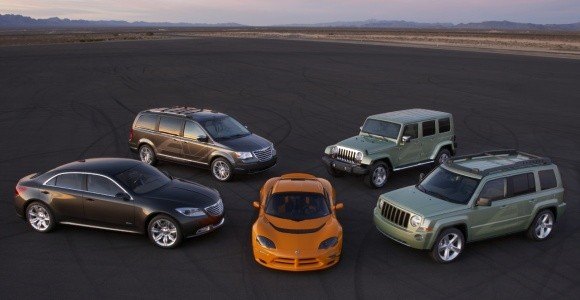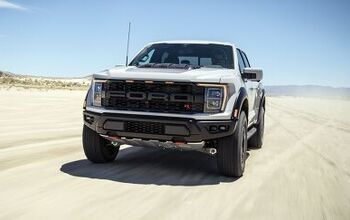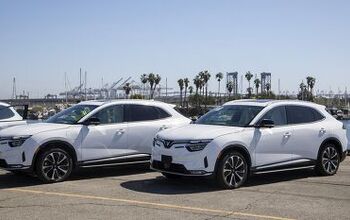Chrysler Cancels Hybrid Ram, Approves Fiat 500 EV For Production
In the leadup to its bailouts and bankruptcy, Chrysler seemed to have suddenly gotten religion about zero-emissions technology, parading around several ENVI electric vehicle prototypes. By the time Fiat had cleared the cobwebs from new product development in Auburn Hills, the EV vaporware had faded into nothingness. With the need to impress politicians ostensibly in Chrysler’s past, the ENVI program was rolled into Chrysler’s normal product development process, and we no longer had to choke back laughter at the idea that Chrysler would replace its unloved Sebring with the pure-electric 200C concept. Chrysler’s embarrassing Two-Mode hybrids were also hidden from view, with only a vague indication that a hybrid Ram might someday become available. When we talked to Ram CEO Fred Diaz at last November’s Five Year Plan announcement, he said that a hybrid Ram was still being considered. Now, egmcartech reports that the Ram hybrid is dead from a commercial standpoint, and that the program will turn into a plug-in hybrid test fleet for Chrysler’s best partner: The Department of Energy, which gave the form $48m to develop a fleet of 140 plug-in Rams. But don’t worry consumers, there’s an alt-energy Chrysler in your future… sort of.
Though the Ram Hybrid has reverted to its original purpose (convincing politicians their (our) money was well-spent on Chrysler), an electric version of the Fiat 500 has been approved for production, and will go on sale starting in 2011. The Freep reports that 500s built at Toluca, Mexico, will have A123 Systems lithium-ion battery packs installed at an undisclosed location, to create the Fiat 500 EV. Chrysler won’t reveal the 500 EV’s power, capacity or range, let alone its price point. Meanwhile, the 500 EV will come out after the Nissan Leaf and Chevrolet Volt start making inroads on America’s EV early adopters.
Needless to say, none of this is wildly encouraging. our interpretation has been that Chrysler avoided too much talk of alt-energy drivetrains because its core business is in such bad shape. Thus far, nothing has changed that conclusion. Chrysler will be releasing some 14 new or refreshed products in the next 12 months, and making those launches successful will require the full attention of Chrysler’s limited resources. A major component in those plans is the need to develop a Fiat 500 dealer network, and the 500 EV won’t be going anywhere until that has been resolved. And Chrysler’s relationship with its dealers still needs a lot of work before new franchises can be issued. If Chrysler does launch a number of halfway-respectable products next year, a niche EV isn’t a bad place for expansion, but it will be entering the market late and will be spearheading its efforts with an expensive little a car that will likely offer few advantages over a Smart EV.
It’s going to take a lot more than this announcement to make Chrysler believers out of us.
More by Edward Niedermeyer
Latest Car Reviews
Read moreLatest Product Reviews
Read moreRecent Comments
- Jalop1991 In a manner similar to PHEV being the correct answer, I declare RPVs to be the correct answer here.We're doing it with certain aircraft; why not with cars on the ground, using hardware and tools like Telsa's "FSD" or GM's "SuperCruise" as the base?Take the local Uber driver out of the car, and put him in a professional centralized environment from where he drives me around. The system and the individual car can have awareness as well as gates, but he's responsible for the driving.Put the tech into my car, and let me buy it as needed. I need someone else to drive me home; hit the button and voila, I've hired a driver for the moment. I don't want to drive 11 hours to my vacation spot; hire the remote pilot for that. When I get there, I have my car and he's still at his normal location, piloting cars for other people.The system would allow for driver rest period, like what's required for truckers, so I might end up with multiple people driving me to the coast. I don't care. And they don't have to be physically with me, therefore they can be way cheaper.Charge taxi-type per-mile rates. For long drives, offer per-trip rates. Offer subscriptions, including miles/hours. Whatever.(And for grins, dress the remote pilots all as Johnnie.)Start this out with big rigs. Take the trucker away from the long haul driving, and let him be there for emergencies and the short haul parts of the trip.And in a manner similar to PHEVs being discredited, I fully expect to be razzed for this brilliant idea (not unlike how Alan Kay wasn't recognized until many many years later for his Dynabook vision).
- B-BodyBuick84 Not afraid of AV's as I highly doubt they will ever be %100 viable for our roads. Stop-and-go downtown city or rush hour highway traffic? I can see that, but otherwise there's simply too many variables. Bad weather conditions, faded road lines or markings, reflective surfaces with glare, etc. There's also the issue of cultural norms. About a decade ago there was actually an online test called 'The Morality Machine' one could do online where you were in control of an AV and choose what action to take when a crash was inevitable. I think something like 2.5 million people across the world participated? For example, do you hit and most likely kill the elderly couple strolling across the crosswalk or crash the vehicle into a cement barrier and almost certainly cause the death of the vehicle occupants? What if it's a parent and child? In N. America 98% of people choose to hit the elderly couple and save themselves while in Asia, the exact opposite happened where 98% choose to hit the parent and child. Why? Cultural differences. Asia puts a lot of emphasis on respecting their elderly while N. America has a culture of 'save/ protect the children'. Are these AV's going to respect that culture? Is a VW Jetta or Buick Envision AV going to have different programming depending on whether it's sold in Canada or Taiwan? how's that going to effect legislation and legal battles when a crash inevitibly does happen? These are the true barriers to mass AV adoption, and in the 10 years since that test came out, there has been zero answers or progress on this matter. So no, I'm not afraid of AV's simply because with the exception of a few specific situations, most avenues are going to prove to be a dead-end for automakers.
- Mike Bradley Autonomous cars were developed in Silicon Valley. For new products there, the standard business plan is to put a barely-functioning product on the market right away and wait for the early-adopter customers to find the flaws. That's exactly what's happened. Detroit's plan is pretty much the opposite, but Detroit isn't developing this product. That's why dealers, for instance, haven't been trained in the cars.
- Dartman https://apnews.com/article/artificial-intelligence-fighter-jets-air-force-6a1100c96a73ca9b7f41cbd6a2753fdaAutonomous/Ai is here now. The question is implementation and acceptance.
- FreedMike If Dodge were smart - and I don't think they are - they'd spend their money refreshing and reworking the Durango (which I think is entering model year 3,221), versus going down the same "stuff 'em full of motor and give 'em cool new paint options" path. That's the approach they used with the Charger and Challenger, and both those models are dead. The Durango is still a strong product in a strong market; why not keep it fresher?


































Comments
Join the conversation
Canadian Chrysler promo piece in the mail. On the Caravan, $6500 plus $1,000 loyalty money, plus employee discount, plus no freight ($1,400). Just about 10K. A $30,000 Caravan discounted to $19,700. (give or take a few bucks. The piece already hit the shredder).
Dont know and really don't care for EV. What I know is everytime my wife sees a 500 she says, a little under her breath, but w/ conviction, "I'll buy me one of those someday". And this from a lady who can't tell the difference between a Smart and a Ram. If enough people think like her. BTW I'd love her to do it, since i could never rationalize its pricing. More power to yhou my love!